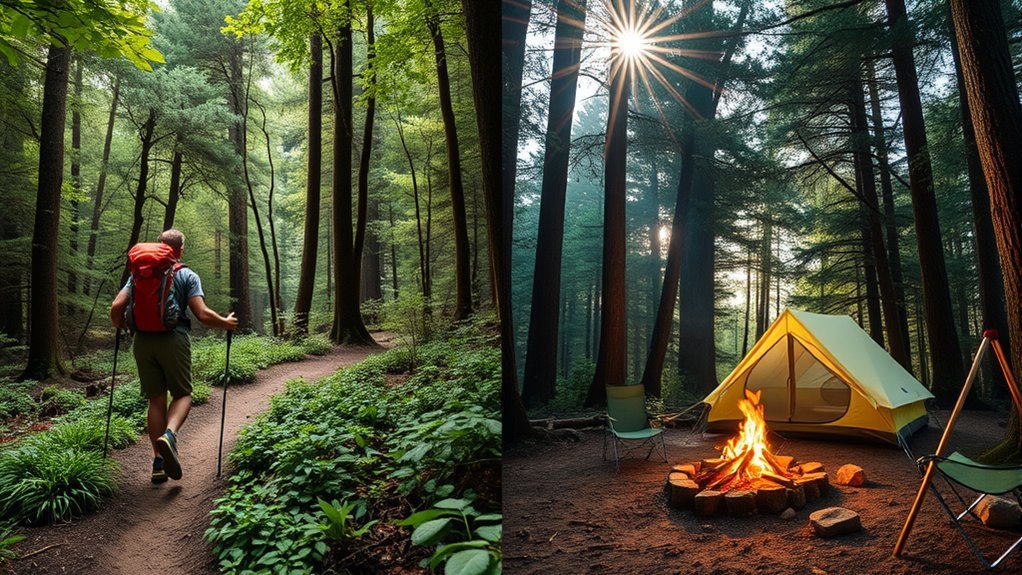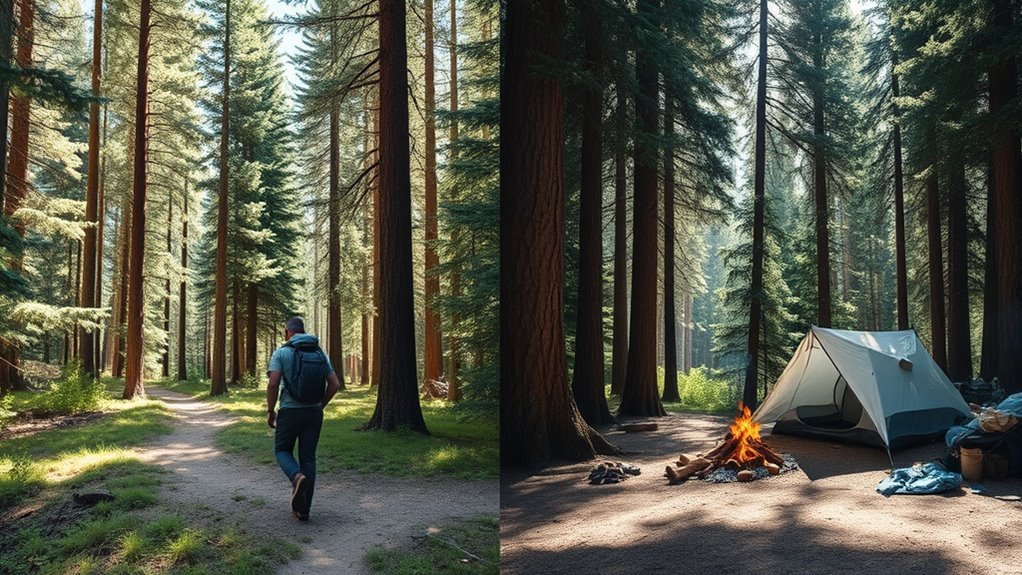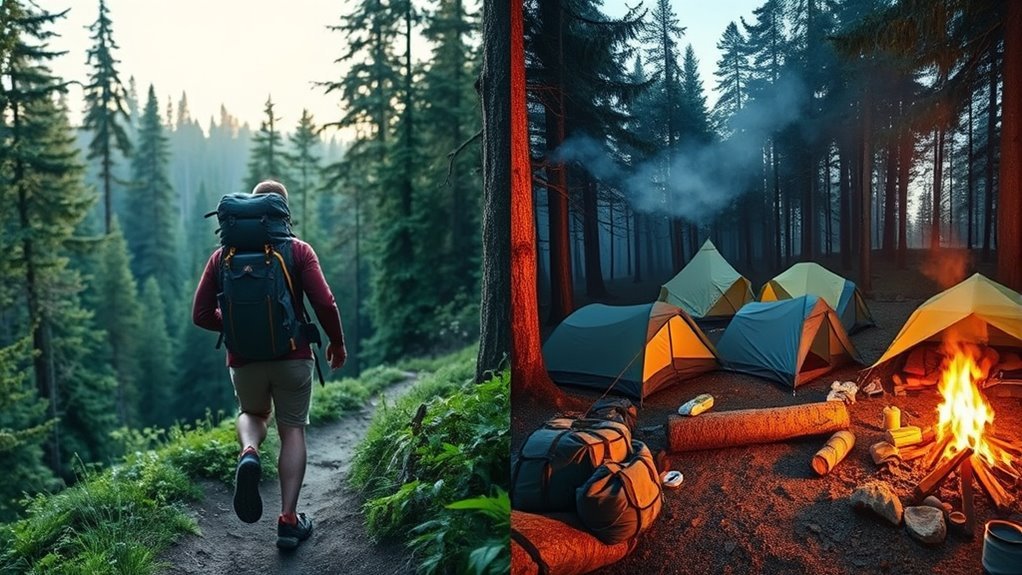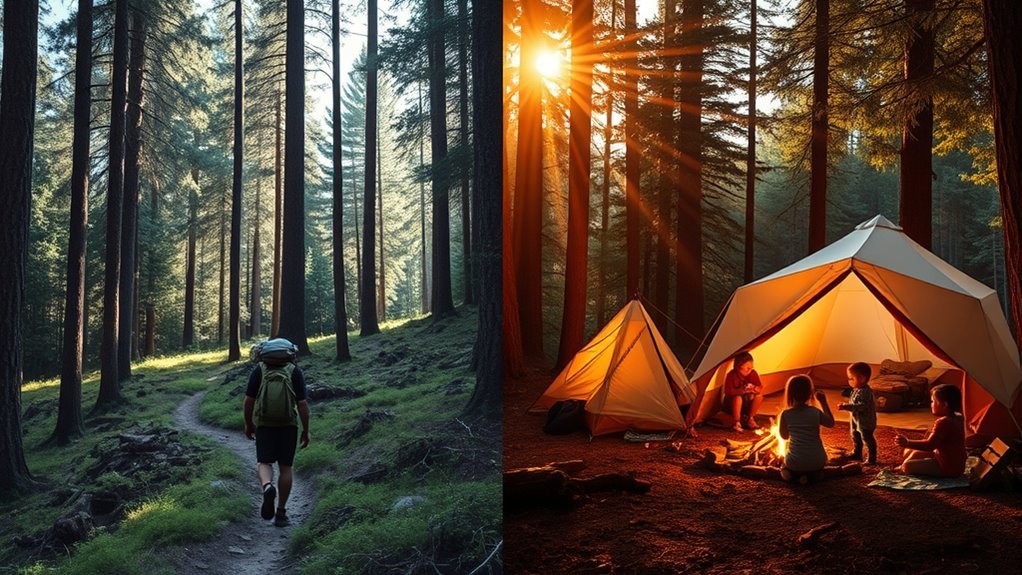When you’re contemplating an outdoor adventure, it’s essential to understand the nuances between backpacking and camping. Each offers unique experiences and caters to different skill levels and preferences. Are you drawn to the challenge of carrying lightweight gear over long distances, or do you prefer the comfort of established campsites? Both options have their allure, but what truly sets them apart, and which one aligns best with your sense of adventure?
Key Takeaways
- Backpacking involves carrying all gear on your back, while camping often uses car transport for equipment.
- Backpacking emphasizes self-sufficiency and adventure; camping focuses on relaxation and socializing.
- Backpacking gear is lightweight and minimalistic; camping gear can be bulkier and more comfortable.
- Backpacking requires higher physical endurance, while camping offers a more relaxed experience.
- Backpacking trips require detailed planning; camping trips allow for flexibility and spontaneity.
Understanding the Basics of Backpacking and Camping

When you plunge into the world of backpacking and camping, you’ll find that each offers a distinct approach to enjoying the great outdoors.
Backpacking involves hiking with all your gear on your back, demanding more survival skills as you venture into remote areas. This outdoor activity lets you explore nature up close, often spanning multiple days and covering significant distances.
In contrast, camping typically occurs in established campgrounds with amenities, providing easier access to equipment via car. This makes camping gear more robust, providing comfort for shorter stays focused on relaxation and local exploration.
Whether you prefer the challenge of backpacking or the convenience of camping, both activities offer unique ways to connect with nature and cater to different adventure styles.
Key Differences in Gear and Equipment
Although both backpacking and camping involve spending time in nature, the gear and equipment you’ll need for each are quite different.
Backpacking requires lightweight and portable gearr, as itnecessitates carrying everything on your back for extended hikes. You’ll need a backpacking tent made from lighter materials, a compact sleeping pad, and a specialized backpack that distributes weight evenly.
In contrast, camping gear can be bulkier since it’s transported by car. Camping tents are larger, providing more space for comfort and socializing. Your sleeping options are more substantial, prioritizing comfort over portability.
Additionally, while backpackers rely on hydration bladders or lightweight water bottles, campers can bring larger water containers or coolers, enhancing their overall camping experience.
Exploring the Varied Experiences Offered

Many find that the experiences offered by backpacking and camping are as diverse as the landscapes they explore.
When you’re exploring the outdoors through backpacking, you’ll embrace the physical demands and adventure of traversing remote trails with lightweight gear.
Camping, however, lets you enjoy a more comfortable and enjoyable setup with camping tents and amenities at established sites.
Here’s how they differ:
- Adventure Level: Backpacking fosters a sense of self-sufficiency and challenge, perfect for those seeking adventure.
- Social Experience: Camping often provides opportunities for social gatherings with friends and family.
- Duration and Setup: Backpacking typically involves longer trips, focusing on distance, whereas camping can be shorter, with a leisurely pace and an emphasis on relaxation.
Each offers a unique way to connect with the outdoor world.
Physical Demands and Activity Levels
As you consider the unique experiences of backpacking and camping, it’s important to weigh the physical demands and activity levels each requires.
In the backpacking vs camping debate, backpacking typically involves heftier physical demands. You’re tasked with carrying a heavy pack over uneven terrain, necessitating greater endurance and fitness. The activity levels in backpacking are sustained, with movement from sunrise to sunset, making it quite a rigorous outdoor adventure.
On the other hand, camping offers a more relaxed experience. It allows you to set up your tent and enjoy leisure time with less intense physical exertion. The stationary nature of camping means gear can be heavier and more robust, unlike the lightweight equipment essential for backpacking’s extended journeys.
Duration and Planning Considerations

When planning your outdoor adventure, consider how the trip length affects your preparation.
Backpacking typically requires a detailed itinerary, as you’ll cover significant distances and need to plan out your route and campsites.
In contrast, camping offers the flexibility to adapt your schedule, letting you enjoy a more relaxed pace with the convenience of vehicle access.
Trip Length Variability
Backpacking and camping trips offer distinct experiences in terms of trip length variability and planning.
When you’re considering a backpacking trip, expect it to last longer, potentially spanning several days or weeks. This is due to the need to cover substantial distances between campsites.
In contrast, camping, especially car camping, is often more flexible. You can opt for an overnight stay or extend it to several days at an established campsite, depending on your preference and campsite regulations.
Here’s a quick breakdown:
- Backpacking Trip: A longer duration trip, requiring careful planning for continuous travel.
- Car Camping: More spontaneous, typically at an established campsite.
- Overnight Stay: Common in camping, where duration depends on individual choice.
Schedule Flexibility Importance
Considering trip length variability, it’s important to discuss the role of schedule flexibility in both backpacking and camping adventures.
Backpacking requires meticulous planning due to its extended duration and the need to cover greater distances daily. This means your schedule needs to be flexible to accommodate physical exertion and unpredictable weather conditions that might alter your route. Unlike camping, which typically involves setting up a base and returning to it after day hikes, backpacking requires that you move and set up camp at new locations each night.
On the other hand, camping offers more spontaneity, as you can adjust plans more easily and stay put if weather conditions turn unfavorable. This makes camping ideal for relaxation and leisurely exploration without the pressure of constant movement.
Itinerary Planning Essentials
When planning your adventure, understanding the differences between backpacking and camping is essential in shaping your itinerary.
Backpacking trips demand meticulous itinerary planning due to their multi-day nature. You’ll need to take into account the weight of backpacking gear, food supplies, and your survival skills to guarantee a successful outdoor experience.
On the other hand, camping trips are more flexible, often lasting a single night to a few days, with the comfort of a base camp.
Take into account these essentials:
- Duration: Backpacking lasts days to weeks; camping is typically shorter.
- Gear: Backpacking gear prioritizes weight and necessity, while camping allows for more comfort.
- Planning: Backpacking requires detailed route and navigation planning, while camping trips focus on comfort and convenience.
Both require attention to weather and permits.
Choosing the Right Adventure for You

When you’re deciding between backpacking and camping, start by evaluating your personal preferences and assessing your skill levels.
Consider the gear and equipment you’ll need, keeping in mind that backpacking demands lighter, more specialized items.
Think about what kind of adventure excites you most, whether it’s embracing nature’s solitude or enjoying a social campfire gathering.
Assessing Personal Preferences
How do you decide between backpacking and camping for your next outdoor adventure?
Start by weighing the pros and cons of each.
Consider these factors:
- Gear and Budget: Camping gear often includes bulky tents and is budget-friendly, while backpacking requires lightweight, sometimes costly equipment.
- Physical Fitness: Backpacking demands higher physical exertion and endurance. If you’re comfortable with nature and enjoy a challenge, it may be a good fit for you.
- Camping, on the other hand, is a more leisurely activity, ideal for those seeking minimal physical exertion.
- Comfort with Nature: Camping offers more amenities and controlled environments, perfect for beginners.
Backpacking immerses you deeper into the wilderness, catering to those seeking solitude.
Assess these elements to choose the adventure that best aligns with your preferences.
Evaluating Skill Levels
Choosing the right outdoor adventure requires a realistic assessment of your skill level and comfort with nature.
Backpacking requires a certain level of fitness and outdoor skills, making it ideal for individuals who thrive on physical exertion and self-reliance. You’ll tackle challenges such as carrying heavy packs, navigating tough terrain, and braving unpredictable weather. If your comfort levels align with these demands, backpacking might be your calling.
On the other hand, camping offers a type of adventure with a lower barrier to entry. It’s ideal for beginners or those seeking a leisurely escape, as it doesn’t demand as much physical effort or survival expertise.
Evaluate personal comfort levels and outdoor experiences to choose between these rewarding experiences.
Gear and Equipment Considerations
Selecting the right gear and equipment is essential in determining whether backpacking or camping is the best fit for you.
Backpacking gear is designed to be lightweight and compact, prioritizing portability for multi-day hikes. Essential gear includes a lightweight tent and sleeping pad, with weight considerations in mind to keep the pack under 30 pounds.
In contrast, camping gear can be larger and more robust since it’s transported by car, offering comforts like spacious tents and elaborate cooking setups.
Here’s a quick breakdown to help you decide:
- Backpacking Gear: Prioritizes minimalism with lightweight tents and essential gear for mobility.
- Camping Gear: Offers comfort with larger tents and additional amenities.
- Weight Considerations: Important for backpackers; less restrictive for campers.
Conclusion
In choosing between backpacking and camping, consider what you want from your outdoor adventure. If you’re seeking the thrill of exploration and enjoy physical challenges, backpacking might be your ideal match. You’ll embrace self-sufficiency and plan meticulously. On the other hand, if you prefer leisure and comfort, camping offers a more relaxed experience with spontaneous opportunities for relaxation. Reflect on your comfort with nature, the physical demands you’re ready for, and the type of memories you want to create.
FAQs
1. Does Backpacking Include Camping?
When backpacking, camping is an essential part of the adventure. You carry all your gear on your back, set up camp at new spots each night, and embrace the elements in various remote locations.
2. What Is the Point of Backpacking?
You commence on backpacking journeys to explore remote wilderness, carrying only essential gear. This adventure boosts self-reliance, connects you to nature, and fosters personal growth by overcoming challenges in navigation, weather, and physical endurance.
3. What Qualifies as a Backpacking Trip?
You qualify a trip as backpacking when you carry all your essentials, navigate remote terrains, and camp overnight in nature. You focus on self-sufficiency and adventure, experiencing varied landscapes over multiple days while minimizing your load.
4. What’s the Difference Between a Backpacking Tent and a Camping Tent?
When you choose a backpacking tent, you’re prioritizing lightweight and compact designs for easy transportation. Camping tents, on the other hand, offer more space and comfort but sacrifice portability, making them ideal for stationary campsites.

